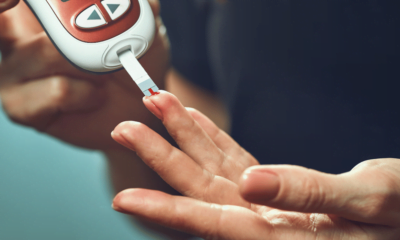Medcan Support, has published new resources for parents and carers who want to know more about medical cannabis and childhood epilepsy. Here, the experts share some of the most common questions they get asked.
The non-for-profit hub, co-founded by parents of epilepsy patients and high profile campaigners Matt Hughes and Hannah Deacon, provides support and education for others seeking cannabis medicines.
The Medcan Support expert committee, which includes cannabis scientist Dr Callie Seaman, paediatric cannabis consultant Dr Bonnie Goldstein and paediatric neurologist Dr Evan Lewis, has responded to a list of frequently asked questions from parents and carers about how to access this treatment.
Medcan Support co-founder Matt, whose son Charlie has a rare epileptic condition known as West syndrome, has seen how medical cannabis has transformed his life and helped bring his seizures under control.
But he didn’t have access to any support or easy-to-find information when he first started researching cannabis.

Matt and Ali Hughes and son Charlie.
“When we first started out, all I had was Google,” he told Cannabis Health.
“Some of the information was incorrect or laws would be different all over the world, it was a very confusing picture and it took a lot of time to really understand everything.
“Through Medcan we have created a central hub for parents to go to. We get so many questions from parents through our Facebook group, this was just a way of bringing them all together.
“For anyone who is looking to try CBD or prescription cannabis for childhood epilepsy, these are the kind of questions you might come across.”
How do I get a prescription for medical cannabis?
At the time of writing, the NHS is not prescribing medical cannabis, so patients must be prepared to pay for a private prescription. However, an NHS specialist is legally permitted to prescribe the medicine, so it is always worth asking.
There are only two clinics prescribing for paediatrics, The Medical Cannabis Clinics or Sapphire, details are on our website. Fill in the details required – this usually includes information about your child and medical history. When the clinic responds, they will provide next steps which will vary by provider. They may contact your neurologist on your behalf. Your records will be sent to the clinic’s consultant who will decide whether you are eligible for medical cannabis treatments. Clinics will not see you without the relevant medical records. If you are eligible for medical cannabis treatment, you will be sent an appointment.
Who can prescribe medical cannabis in the UK?
Any doctor on the GMC Specialist Register can prescribe. This is usually a hospital consultant. A GP can prescribe under shared care arrangements under the direction of a specialist. You are more likely to be prescribed medical cannabis from a doctor working for a medical cannabis clinic as those doctors are more likely to have been trained in cannabis medicine.
What is the difference between CBD and THC?
Both THC and CBD have medical properties. THC is the cannabinoid that is the major part of recreational cannabis and in high doses can cause impairment. In lower doses it is a muscle relaxant, can help with sleep and many different causes of pain. It can also help with nausea and other chemotherapy related side effects and shown to be effective in epilepsy. CBD does not cause impairment. CBD is often used in anxiety, epilepsy and pain management also.
There is much overlap between the two when controlling symptoms. When you are assessed by a doctor they will determine the combination that is most likely to help your symptoms.
Most doctors start with a higher CBD product with small amounts of THC and increase the dose slowly, but it will depend on your previous exposure to cannabis and your symptoms. If prescribed carefully, the side effects one commonly recognises with recreational cannabis and unopposed THC use are usually very minimal and well tolerated.
What is the entourage effect?
Cannabis not only contains phytocannabinoids, but also other chemicals called terpenes (which give smell) and flavonoids (which give colour). There are over 100 terpenes and flavonoids. It is thought that the full plant with all those components in various proportions gives a better medical effect than the individual parts. That is the entourage effect. Science doesn’t fully understand the interaction of phytocannabinoids and terpenes within the human body, but observational data and open label studies are leaning towards the use of the whole plant has a better medical effect than isolated parts.
How is medical cannabis taken or administered?
Medical cannabis for childhood epilepsy is usually prescribed as an oil. For the best bioavailability it’s recommended to leave under the tongue, but generally with children suffering develop delay or learning difficulties, this is simply unrealistic. Swallowing is fine and may require a little bit more oil to reach a therapeutic dose.
For children who may have difficulties swallowing, the oil can be administered via feeding tubes although not recommended to mix with water.
What dose should I take?
Your doctor will advise on the dose. Generally, you will be started on a low dose – at around 1mg per kg of body weight and gradually increase in increments. Studies show that around 10- 15mgs/kg is in the therapeutic range, but each child will respond differently. Some may require much less and others much more. If the doctor wants to add in THC then again it starts low (even as low as 1mg THC) and builds up slowly.
We are on the ketogenic diet, can we use cannabis?
Yes you can use CBD/cannabis oil in conjunction with the Ketogenic Diet, but be very careful to the carrier used. Although most CBD oils use MCT oils as the carrier, some have added flavourings which could be from sugars which would impact ketones produced. If prescribed your clinician should be aware of the carrier oils of products. Speak with your ketogenic dietician if uncertain.
Can CBD / cannabis be administered in hospital?
If you’re using an over the counter CBD oil then no you won’t be allowed to administer it in Hospital, if however you have a prescribed oil, then you should be allowed to administer it. You may need to give the hospital notice and let them know the dosing regime.
Can CBD / cannabis be administered in playgroup/ school?
If it’s a prescribed oil with the correct pharmacy labelling on the bottle, this should be fine, but it has been known that some schools are hesitant in administration and ask parents do so.
What are the side effects of medical cannabis?
CBD is generally very safe, but can give some people stomach upsets, diarrhoea, dizziness and tiredness. THC has more side effects and these can include dizziness, disorientation, drowsiness and dry mouth. Your doctor will start you on a low dose and increase it gradually so that side effects are minimised. Serious side effects, like a psychotic episode, should be avoided by careful screening of whether you are suitable for treatment in the first place.
Does THC affect the developing brain?
Some reports have said that THC can damage the developing brain in children and adolescents. There is no evidence of this in the low doses generally used in cannabis medicine. There are some reports of such problems in high THC recreational cannabis users, but those reports are also controversial. In the low THC doses used in medical practice, that risk is very small indeed.
What will I pay for a medical cannabis prescription?
You will pay for the cost of treatments – an average of £500 per month for your products. Families of children with epilepsy will see costs from £1000+ per month but costs are coming down. You will also pay the cost of import, which can be around £150 per prescription.
However, now bulk importation of medical cannabis products are permitted, we see prices reducing as this cost is split between multiple patients. You will also pay the costs of the pharmacy as well as the cost of any consultation – face to face or telehealth with your consultant. This is usually around £200 for the first consultation and less for follow-up visits, which need to be monthly at first but if you are stable then can then be less frequent.
For more FAQs and other resources and support around medical cannabis and epilepsy visit Medcan Support.

 Science5 months ago
Science5 months ago
 News6 months ago
News6 months ago
 News6 months ago
News6 months ago
 Health5 months ago
Health5 months ago
 Health4 months ago
Health4 months ago
 Science6 months ago
Science6 months ago
 Cannabis explained6 months ago
Cannabis explained6 months ago
 Science6 months ago
Science6 months ago













